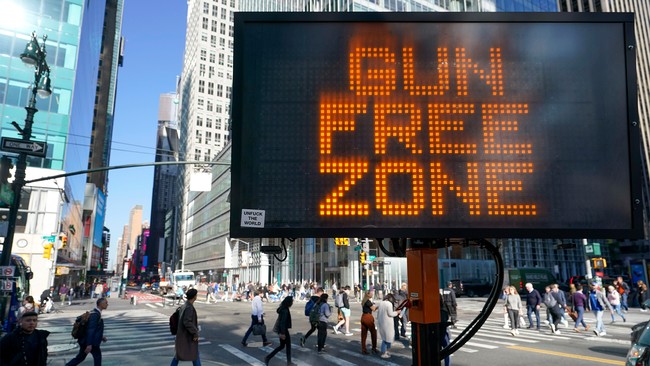For decades, there was little debate over which New England state had the best gun laws when it came to protecting our right to keep and bear arms. Vermont was the first Constitutional Carry state in the nation, and even as voters sent far-left Democrats like Bernie Sanders to Washington, D.C., the state legislature routinely rejected any attempts to infringe on our Second Amendment rights.
That’s changed over the past decade or so, and the state now has a 72-hour waiting period on gun purchases, a “red flag” law, and “universal” background checks in place. And if a group of Democratic lawmakers get their way, the state will also soon have a new category of “gun-free zones” as well; bars and restaurants where alcohol is served.
The proposal, which could make Vermont one of just 16 states to ban guns in bars and the first in New England, has ignited a new debate about guns in a state that is both politically liberal and fiercely defensive about gun rights. The measure has found enthusiastic support from left-leaning politicians and pragmatists who say guns simply don’t belong where alcohol is served. But in a state where half of adults own guns, it has also set off intense pushback from gun rights advocates.
As well it should. While it’s never a good idea to mix guns and drinking (something I acknowledged over the weekend, as a matter of fact), the state already prohibits carrying while intoxicated. This bill would disarm lawful gun owners in every retail establishment in the state where it’s possible to order a drink, even if those gun owners have no plans of tossing back a pint or a shot while they’re carrying. That puts them at risk of harm, but it also increases the odds of their firearms being stolen if they’re forced to lock them away in their vehicle outside of their control instead of keeping their carry gun holstered on their person.
The good news is that, according to the Boston Globe, the bill appears to be struggling to find traction, even in the Democrat-dominated legislature.
“I’ve heard positive reaction from bar owners,” said Conor Casey, executive director of GunSense Vermont, a non-partisan gun violence prevention group. “They’d like to prevent something bad before it happens.”
But questions are already being raised about the practicality of implementing such a ban. And with major economic issues such as soaring property taxes and a raging debate over education spending already preoccupying the Legislature, some doubt the bill will even come up for a vote this session.
Some gun rights advocates, meanwhile, are rallying against it. Chris Bradley, president and executive director of the Vermont Federation of Sportsmen’s Clubs, which represents 50 clubs and 14,000 members across the state, said his organization opposes the ban, believing it is unconstitutional and will make Vermonters less, not more, safe.
Bradley said the Supreme Court has given guidance on gun bans, such as those for government buildings and courthouses, but said those bans are enforced with metal detectors and armed police on site.
“In those cases, I have a reasonable expectation that everybody’s disarmed and safe,” Bradley said. “Absent that, my safety is at risk. If you’re saying a bar is a dangerous place, isn’t that a place where a citizen might want to protect themselves?”
And keep in mind that property owners can already prohibit carrying if they choose to do so. No bar or restaurant is required to allow patrons to lawfully carry, but HB 45 would take that discretion away from the owners of these establishments and substitute a heavy-handed mandate instead. Under the terms of the bill, carrying in any establishment with a liquor license could result in a year-long prison sentence and a $1,000 fine, while businesses with liquor licenses that fail to post the required “no guns allowed” signage could face $500 fines of their own.
Bradley describes the bill as a solution in search of a problem, and he’s right that the Supreme Court has previously suggested that legitimate “sensitive places” are those spaces where there are already additional security measures in place. If HB 45 does end up winning the approval of both the legislature and Republican Gov. Phil Scott, that argument will undoubtably be used in the inevitable legal challenge to come, but it’s good to see that the Vermont Federation of Sportsmen’s Clubs is already trying to keep this bad bill from becoming a terrible law, which would be a much better outcome.
Read the full article here










![Texas Lawmaker Faces Backlash Over Holocaust Comparison, Issues an Apology [WATCH] Texas Lawmaker Faces Backlash Over Holocaust Comparison, Issues an Apology [WATCH]](https://www.rvmnews.com/wp-content/uploads/2025/08/2025.08.06-08.35-rvmnews-6893bc80d6a0c.jpg)
